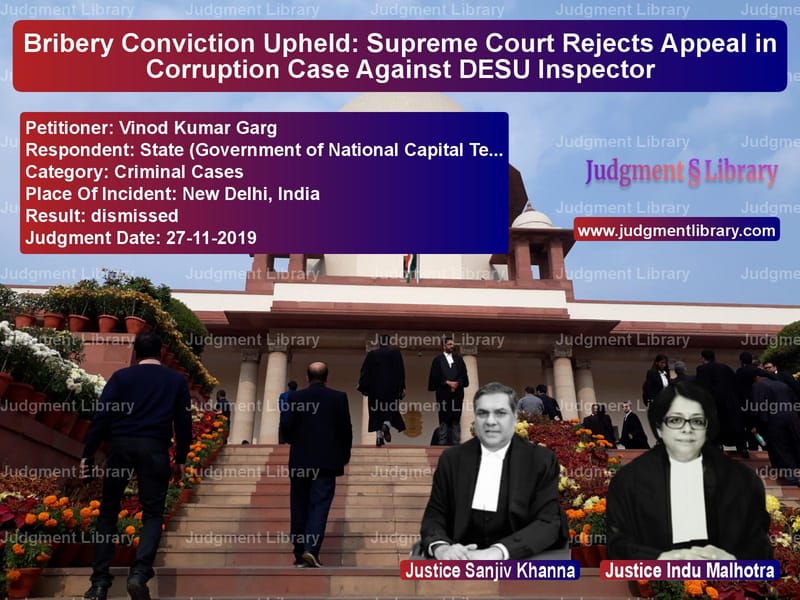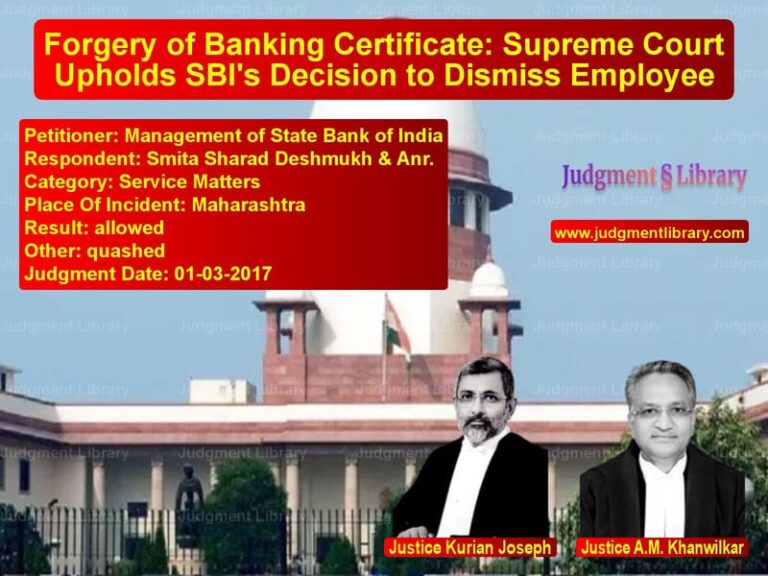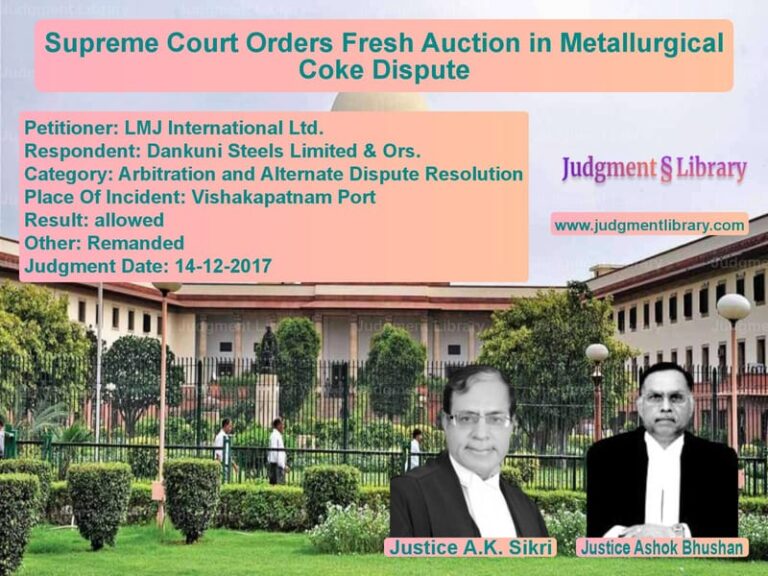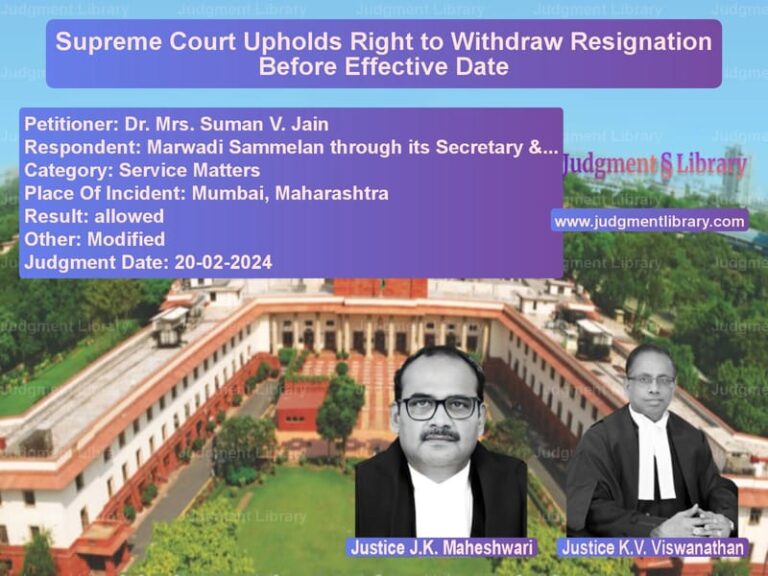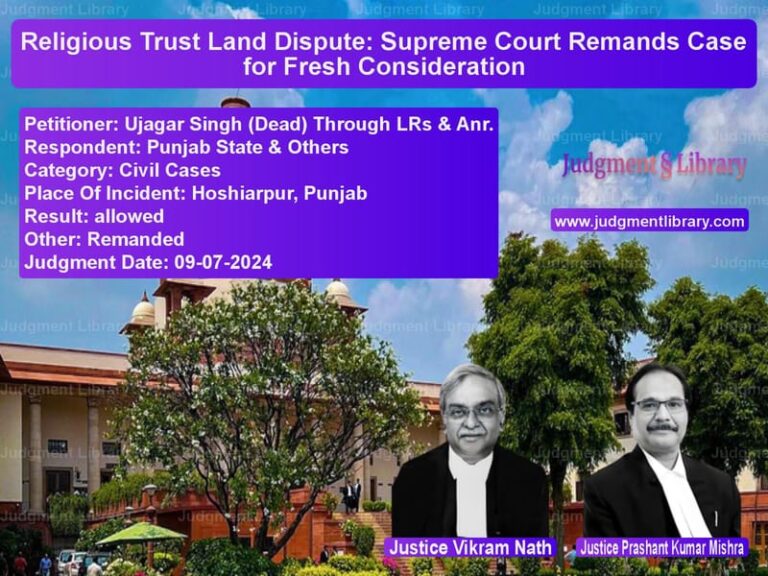Bribery Conviction Upheld: Supreme Court Rejects Appeal in Corruption Case Against DESU Inspector
On November 27, 2019, the Supreme Court of India delivered its final judgment in the case of Vinod Kumar Garg vs. State (Government of National Capital Territory of Delhi). The case centered on allegations of corruption under the Prevention of Corruption Act, 1988. The appellant, Vinod Kumar Garg, was convicted by the Special Judge, Delhi, for accepting a bribe while serving as an Inspector in the Delhi Electric Supply Undertaking (DESU). His conviction was upheld by the Delhi High Court. The Supreme Court, after reviewing the appeal, reaffirmed the conviction, citing sufficient evidence to prove the demand and acceptance of bribe.
Background of the Case
The appellant, Vinod Kumar Garg, was working as an Inspector in DESU. The case against him arose when a complainant, Nand Lal, approached the Anti-Corruption Branch (ACB) of Delhi, alleging that the appellant had demanded a bribe for providing an electricity connection to his industrial shed. The allegations led to a formal investigation, including a trap set up by the ACB, during which the appellant was caught accepting a bribe of Rs. 500.
Charges Against the Appellant
The appellant was charged under:
- Section 7 of the Prevention of Corruption Act, 1988 – Public servant taking gratification other than legal remuneration.
- Section 13 of the Prevention of Corruption Act, 1988 – Criminal misconduct by a public servant.
Prosecution’s Case
The prosecution presented the following key arguments:
- Complainant Nand Lal (PW-2) had approached the Anti-Corruption Branch on August 2, 1994, alleging that the appellant had demanded Rs. 2,000 to provide an electricity connection.
- A trap was laid on August 3, 1994, during which the complainant handed over five currency notes of Rs. 100 each to the appellant.
- The tainted currency notes, coated with phenolphthalein powder, were recovered from the appellant’s pant pocket.
- Inspector Rohtash Singh (PW-5) of the ACB confirmed the presence of the tainted currency and conducted necessary chemical tests, which turned pink upon reaction, proving the exchange of bribe money.
- Panch witness Hemant Kumar (PW-3) corroborated the sequence of events leading to the appellant’s arrest.
Defense’s Case
The appellant contested his conviction on the following grounds:
- There were contradictions in the testimonies of key prosecution witnesses, particularly regarding where and how the money was allegedly demanded and accepted.
- The prosecution failed to provide any documentary evidence proving that the complainant was a legitimate tenant in the industrial shed requiring an electricity connection.
- The hand-wash and pocket-wash tests were not conducted, weakening the claim that the appellant had directly handled the bribe money.
- The sanction for prosecution was granted without full application of mind by the competent authority.
Supreme Court’s Observations
The Supreme Court carefully analyzed the evidence and dismissed the appellant’s arguments. Key observations included:
- The inconsistencies in witness testimonies were minor and did not affect the overall credibility of the prosecution’s case.
- The complainant’s signature on pre-trap and post-trap documents demonstrated his active participation in the investigation.
- The statutory presumption under Section 20 of the Prevention of Corruption Act applied, as the accused was found in possession of the bribe money.
- The presence of the tainted currency in the appellant’s pocket was sufficiently corroborated by multiple witnesses, including the investigating officer.
Final Judgment
The Supreme Court ruled:
“The contradictions highlighted by the appellant are minor and do not detract from the core evidence of demand and acceptance of bribe. The statutory presumption under Section 20 of the Prevention of Corruption Act applies, and the appellant has failed to provide a satisfactory explanation for possessing the tainted currency.”
Accordingly, the Court upheld the conviction and sentenced the appellant to rigorous imprisonment for one and a half years, along with a fine of Rs. 1,000 for each offense. The sentences were ordered to run concurrently.
Conclusion
The judgment underscores the strict legal stance against corruption by public officials. The Supreme Court reaffirmed that minor inconsistencies in witness statements do not outweigh substantial evidence of bribery. The decision reinforces the principle that public servants must be held accountable for misconduct and that courts will uphold anti-corruption laws to ensure transparency and integrity in governance.
Petitioner Name: Vinod Kumar Garg.Respondent Name: State (Government of National Capital Territory of Delhi).Judgment By: Justice Sanjiv Khanna, Justice Indu Malhotra.Place Of Incident: New Delhi, India.Judgment Date: 27-11-2019.
Don’t miss out on the full details! Download the complete judgment in PDF format below and gain valuable insights instantly!
Download Judgment: Vinod Kumar Garg vs State (Government of Supreme Court of India Judgment Dated 27-11-2019.pdf
Direct Downlaod Judgment: Direct downlaod this Judgment
See all petitions in Fraud and Forgery
See all petitions in Bail and Anticipatory Bail
See all petitions in Money Laundering Cases
See all petitions in Judgment by Sanjiv Khanna
See all petitions in Judgment by Indu Malhotra
See all petitions in dismissed
See all petitions in supreme court of India judgments November 2019
See all petitions in 2019 judgments
See all posts in Criminal Cases Category
See all allowed petitions in Criminal Cases Category
See all Dismissed petitions in Criminal Cases Category
See all partially allowed petitions in Criminal Cases Category

